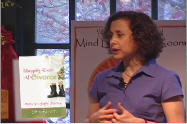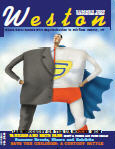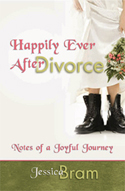HAPPILY EVER AFTER BLOG
Want to be inspired? Learn more about creating a great life after divorce? Or do you have some wisdom or thoughts of your own to share? Check out Jessica’s Happily Ever After Blog.
RESOURCES
Visit Jessica’s Resources page to find helpful links to divorce support sites, helpful books and publications, and how to find out more about Jessica’s food program.
MAILING LIST
Join our mailing list for updates & appearances. Make sure to include your e-mail address.
Happily Ever After Divorce: Notes of a Joyful Journey by Jessica Bram
published by Health Communications, Inc. (2009)
First Place Winner of
2010 Connecticut Press Club
Nonfiction-Biography/Autobiography
Book Award
Recommended by AARP Magazine among its “Books for Grownups: What Our Generation Wants to Read”
One day, at age forty-one, with three young children, I took a terrifying, guilt-inducing leap. After years of unhappiness, I finally found the courage to get out of my marriage.
It was hard, no question. Hard like childbirth, like building a skyscraper or perhaps demolishing one. As hard as any of the most formidable challenges I had ever faced—every college or graduate school degree, every major disruption, every relocation, every turnaround.
But then, as after childbirth, a glorious new life emerged—but this time, it was my own. After my divorce I emerged into sunlight, stunned and blinking. Disoriented, yes, and many, many times afraid. But only then did life begin. Only then did I start to piece together, for the first time ever, a life that had fresh air and laughter, challenges and triumphs. A life of outer joys, and for the first time, inner peace.
I am here to say that it can be done.

Maybe I was imagining it. But damned if every bulb in my house didn’t start blowing the week my husband moved out. The problem was so persistent that for a while I even suspected some kind of sabotage on my husband’s part. But my friend Eve assured me otherwise. “Bulbs blow out all the time. That’s what they do,” she said.
Well, of course I knew that bulbs blew out. But my perception after nineteen years of marriage was that soon after they always somehow became replaced. My husband prided himself on his skills in home repair, and I had long been secure in the knowledge that, just say the word and rooms that were temporarily dark would soon once again be light. Just as dripping faucets would eventually stop leaking and overflowing roof gutters made clear. There never seemed to be any question that these tasks, which my husband performed with cheerful vigor, were his preordained responsibility, separate and mysterious …

As if I didn’t feel bad enough about my divorce, the whole world seemed to be conspiring to make me feel worse. Like the engraved acrylic sign on the reception desk of the pediatric ophthalmologist (yes, someone had actually taken the trouble to have it permanently imprinted):
Notice to Divorced Parents: Payment is the responsibility of the parent accompanying the patient and must be paid in full prior to service.
Until that moment, all I had been thinking of was the note sent home by David’s first-grade teacher saying that he seemed to have some trouble reading the board. Despite some of Bill’s and my ugly arguments about money during our divorce, I knew that the last thing either of us would ever object to paying for was anything related to the children’s health. But this sign seemed to brand me as a criminal the moment I walked in the door.
My humiliation turned to outrage. Talk about kicking people when they’re down.
I confronted the receptionist: “How can you single out divorced patients like that?” I asked. She answered curtly. “We’ve had too many instances of our bills going unpaid because there’s a dispute over which divorced parent is supposed to pay for the appointment. We just can’t get into that” …
… It was hard, in my emotionally worn-out state, not to allow all these naysayers to beat me down even further than I already was. Along with the child psychiatrist who had assured us it was “going to be hell,” there were plenty of them. A neighbor responded to the news of our divorce with a distressed, “Oh, dear—and we thought you were such a nice family!” then warned in a whisper how likely it was for children from “broken” homes to have problems with alcohol and drugs …
… The world suddenly seemed to see us either as criminals, or carriers of a communicable disease that might infect the neighborhood. It was as though we had violated some fundamental human contract. The message was clear: You are guilty. You must be punished.
As though I wasn’t spending enough time fearing poverty, eating my way through loneliness, or recriminating myself for ruining my children’s lives, this was the last thing I needed to hear. Even on the good days—days that I felt mostly relief at being free of the strife of my marriage, there would inevitably come some sorrowful “I’m so sorry!” to once more deepen my sense of guilt.
Representation by Sharlene Martin




